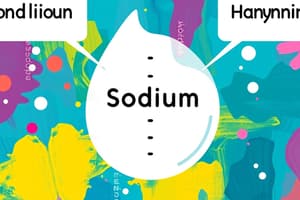Podcast
Questions and Answers
What serum sodium concentration defines hyponatremia?
What serum sodium concentration defines hyponatremia?
- Less than 145 mEq/L
- Less than 120 mEq/L
- Less than 135 mEq/L (correct)
- Less than 130 mEq/L
Which of the following is a cause of euvolemic hyponatremia?
Which of the following is a cause of euvolemic hyponatremia?
- Diuretic use
- Syndrome of Inappropriate Antidiuretic Hormone (SIADH) (correct)
- Heart failure
- Excessive IV fluid administration
What is a mild symptom of hyponatremia?
What is a mild symptom of hyponatremia?
- Respiratory arrest
- Nausea (correct)
- Coma
- Seizures
Which test is NOT part of the diagnosis for hyponatremia?
Which test is NOT part of the diagnosis for hyponatremia?
What is the primary treatment for severe hyponatremia?
What is the primary treatment for severe hyponatremia?
What should be the maximum rate of correction for hyponatremia to avoid complications?
What should be the maximum rate of correction for hyponatremia to avoid complications?
Which of the following conditions is associated with hypervolemic hyponatremia?
Which of the following conditions is associated with hypervolemic hyponatremia?
What is a characteristic of hypovolemic hyponatremia?
What is a characteristic of hypovolemic hyponatremia?
Flashcards are hidden until you start studying
Study Notes
Hyponatremia Overview
- Definition: Hyponatremia is a condition characterized by low sodium levels in the blood, typically defined as a serum sodium concentration of less than 135 mEq/L.
Causes
- Excessive Water Intake:
- Psychogenic polydipsia
- Excessive IV fluid administration
- Sodium Loss:
- Diuretics (especially thiazides)
- Gastrointestinal losses (vomiting, diarrhea)
- Adrenal insufficiency (Addison's disease)
- Renal disorders
- Syndrome of Inappropriate Antidiuretic Hormone (SIADH):
- Malignancies (e.g., small cell lung cancer)
- Pulmonary disorders (e.g., pneumonia)
- Neurological conditions (e.g., stroke, head injury)
Symptoms
- Mild Symptoms:
- Nausea
- Headache
- Confusion
- Severe Symptoms:
- Seizures
- Coma
- Respiratory arrest
Types
- Hypovolemic Hyponatremia:
- Loss of both sodium and water, but more sodium loss.
- Causes: Diuretics, vomiting, diarrhea.
- Euvolemic Hyponatremia:
- Normal total body sodium but excess water.
- Causes: SIADH, hypothyroidism.
- Hypervolemic Hyponatremia:
- Excess total body water relative to sodium.
- Causes: Heart failure, liver cirrhosis, nephrotic syndrome.
Diagnosis
- Lab Tests:
- Serum sodium level
- Serum osmolality
- Urine sodium concentration
- Urine osmolality
- Clinical Evaluation:
- Assess volume status (hypovolemic, euvolemic, hypervolemic)
Treatment
- Mild Cases:
- Fluid restriction
- Correction of underlying causes
- Severe Cases:
- Hypertonic saline (3% NaCl) in a hospital setting
- Monitor serum sodium levels to avoid rapid correction (risk of osmotic demyelination syndrome)
Considerations
- Rate of Correction: Should not exceed 8-12 mEq/L per day to prevent complications.
- Follow-up: Regular monitoring of sodium levels during treatment to ensure safe correction.
Hyponatremia Overview
- Hyponatremia is defined as a serum sodium concentration of less than 135 mEq/L, indicating low sodium levels in the blood.
Causes
-
Excessive Water Intake:
- Conditions like psychogenic polydipsia and high intravenous fluid administration can lead to excess water intake.
-
Sodium Loss:
- Common causes of sodium loss include diuretics (especially thiazide types), gastrointestinal losses from vomiting or diarrhea, adrenal insufficiency (such as Addison's disease), and various renal disorders.
-
Syndrome of Inappropriate Antidiuretic Hormone (SIADH):
- SIADH can arise from malignancies like small cell lung cancer, pulmonary disorders such as pneumonia, and neurological conditions including strokes and head injuries.
Symptoms
-
Mild Symptoms:
- May include nausea, headache, and confusion.
-
Severe Symptoms:
- Potentially life-threatening symptoms include seizures, coma, and respiratory arrest.
Types
-
Hypovolemic Hyponatremia:
- Characterized by loss of sodium and water, with greater sodium loss; often caused by diuretics, vomiting, or diarrhea.
-
Euvolemic Hyponatremia:
- Normal total body sodium but excess water is present; associated with causes like SIADH and hypothyroidism.
-
Hypervolemic Hyponatremia:
- Conditions caused by an excess of total body water compared to sodium; linked to heart failure, liver cirrhosis, and nephrotic syndrome.
Diagnosis
-
Lab Tests:
- Serum sodium level, serum osmolality, urine sodium concentration, and urine osmolality are key tests for diagnosis.
-
Clinical Evaluation:
- Assess patient volume status to categorize the type of hyponatremia: hypovolemic, euvolemic, or hypervolemic.
Treatment
-
Mild Cases:
- Treatment involves fluid restriction and addressing underlying conditions.
-
Severe Cases:
- Management may require the administration of hypertonic saline (3% NaCl) in a hospital setting, with careful monitoring of serum sodium levels to avoid rapid correction.
Considerations
-
Rate of Correction:
- Correction of serum sodium levels should not exceed 8-12 mEq/L per day to prevent complications like osmotic demyelination syndrome.
-
Follow-up:
- Regular monitoring of sodium levels during treatment is crucial to ensure safe correction.
Studying That Suits You
Use AI to generate personalized quizzes and flashcards to suit your learning preferences.




